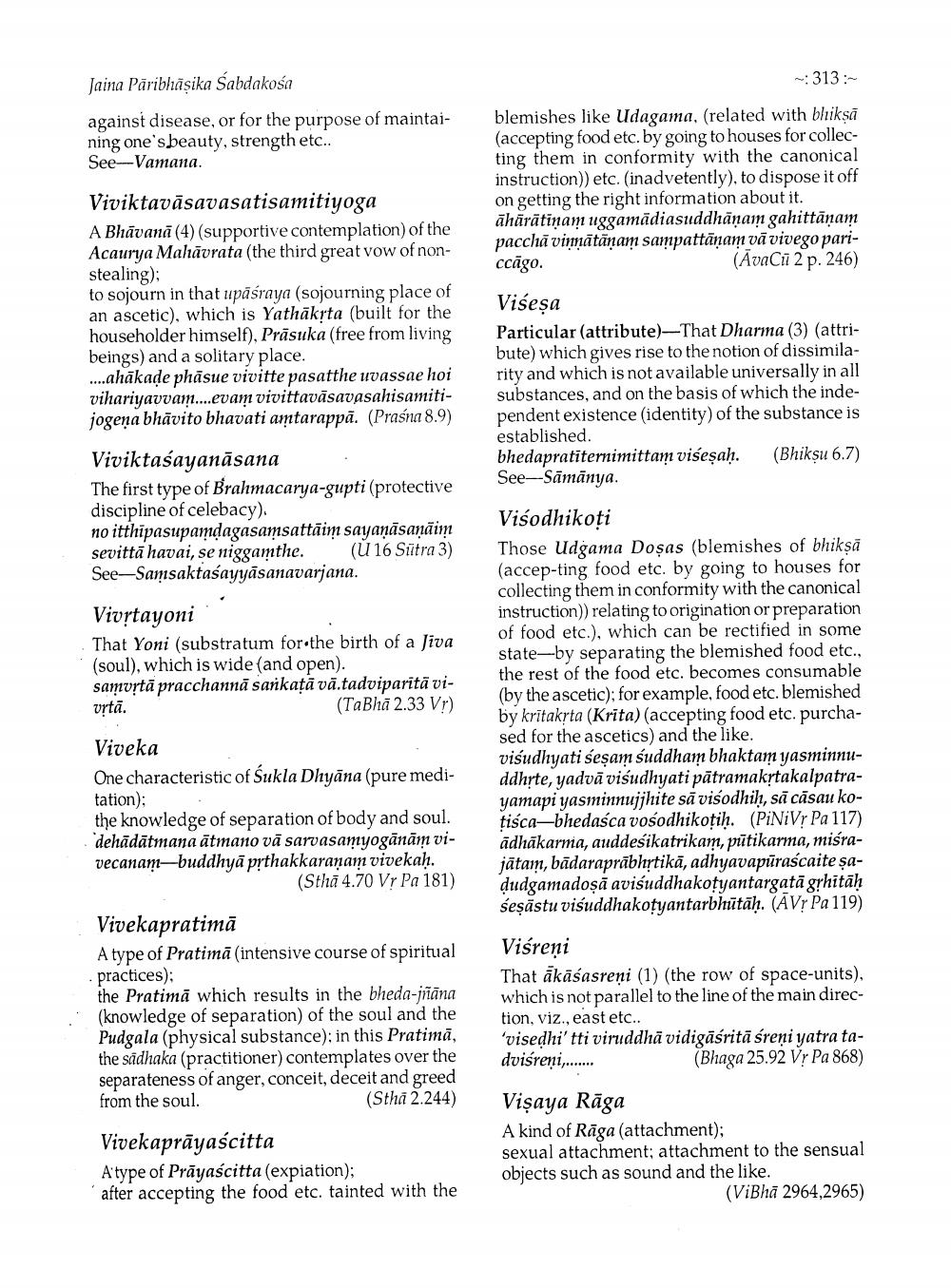________________
Jaina Paribhāṣika Sabdakosa
against disease, or for the purpose of maintaining one's beauty, strength etc.. See-Vamana.
Viviktavāsavasatisamitiyoga
A Bhavand (4) (supportive contemplation) of the Acaurya Malavrata (the third great vow of nonstealing);
to sojourn in that upśraya (sojourning place of an ascetic), which is Yathäkṛta (built for the householder himself), Präsuka (free from living beings) and a solitary place. ....ahakade phasue vivitte pasatthe uvassa hoi vihariyavvam....evam vivittavāsavasahisamitijogena bhävito bhavati amtarappa. (Praśna 8.9)
Viviktasayanāsana
The first type of Brahmacarya-gupti (protective discipline of celebacy). no itthipasupandagasamsattaim sayaṇāsaydim sevittä havai, se niggamthe. (U16 Sütra 3) See-Samsaktaśayyasanavarjana.
Vivṛtayoni
That Yoni (substratum for the birth of a Jiva (soul), which is wide (and open). samurta pracchannā sankaṭā va.tadviparita vivṛtā. (TaBhā 2.33 Vr)
Viveka
One characteristic of Sukla Dhyana (pure meditation);
the knowledge of separation of body and soul. dehädätmana ātmano va sarvasamyogānām vivecanam-buddhyā pṛthakkaraṇam vivekaḥ, (Stha 4.70 Vr Pa 181)
Vivekapratima
A type of Pratima (intensive course of spiritual practices);
the Pratima which results in the bheda-jñana (knowledge of separation) of the soul and the Pudgala (physical substance); in this Pratima, the sadhaka (practitioner) contemplates over the separateness of anger, conceit, deceit and greed from the soul. (Stha 2.244)
Vivekaprayaścitta
Atype of Prayascitta (expiation); after accepting the food etc. tainted with the
~313~
blemishes like Udagama, (related with bliksi (accepting food etc. by going to houses for collecting them in conformity with the canonical instruction)) etc. (inadvetently), to dispose it off on getting the right information about it. ähärätinam uggamādiasuddhāṇam gahitṭāṇam paccha vimmätänam sampattanam va vivego pariccago. (AvaCi 2 p. 246)
Viseṣa
Particular (attribute)-That Dharma (3) (attribute) which gives rise to the notion of dissimilarity and which is not available universally in all substances, and on the basis of which the independent existence (identity) of the substance is established.
(Bhiksu 6.7)
bhedapratiternimittam viseṣaḥ. See-Samanya.
Viśodhikoti
Those Udgama Dosas (blemishes of blikṣa (accep-ting food etc. by going to houses for collecting them in conformity with the canonical instruction)) relating to origination or preparation of food etc.), which can be rectified in some state-by separating the blemished food etc... the rest of the food etc. becomes consumable (by the ascetic); for example, food etc. blemished by kritakṛta (Krita) (accepting food etc. purchased for the ascetics) and the like. visudhyati sesam suddham bhaktam yasminnuddhṛte, yadva visudhyati pätramakṛtakalpatragamapi wasnimjjhite sd visodhil, sử cả sau k tisca-bhedasca vośodhikotih. (PiNiVr Pa117) ädhäkarma, auddesikatrikam, putikarma, misrajātam, badaraprabhṛtikā, adhyavapurascaite sadudgamadosa avisuddhakotyantargata grhitäh seṣāstu visuddhakotyantarbhūtäh. (AV Pa119)
Viśreņi
That ākāśasreni (1) (the row of space-units). which is not parallel to the line of the main direction, viz., east etc..
'visedhi'tti viruddha vidigäśritä śreni yatra tadvisreni........ (Bhaga 25.92 Vr Pa 868)
Viṣaya Raga
A kind of Raga (attachment);
sexual attachment; attachment to the sensual
objects such as sound and the like.
(ViBha 2964,2965)




